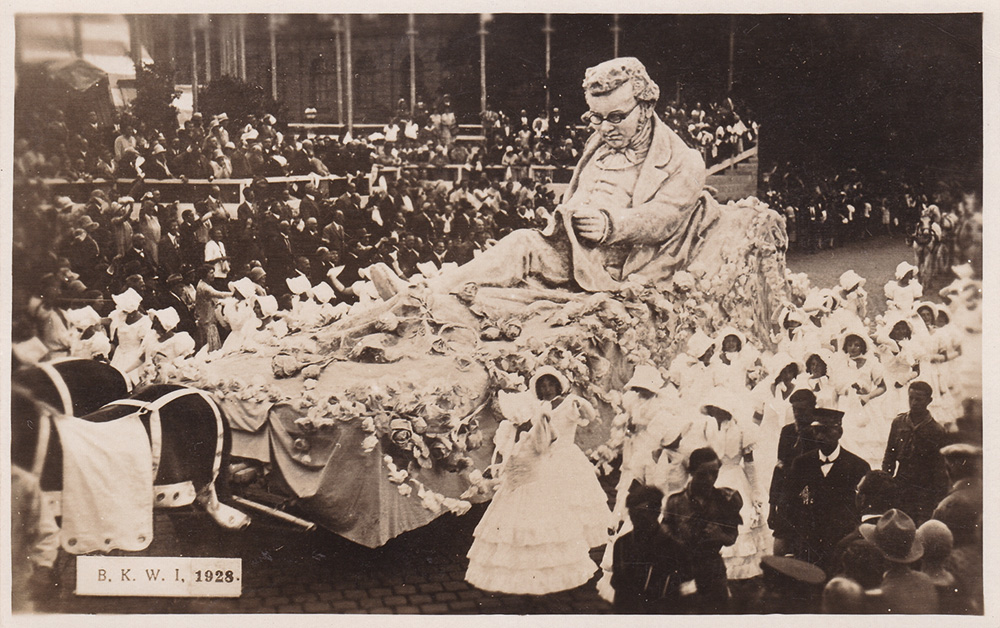Musik und Klänge sind fixe Bestandteile von religiösen und politischen Ritualen, von Festen und Inszenierungen diverser sozialer Gruppierungen. Sie können das Besondere der Veranstaltungen betonen, das Gemeinschaftsgefühl stärken – sie haben daher eine wichtige Rolle zur Identifikationsstiftung – und sie können als Träger ideologischer Botschaften eingesetzt werden. Im sogenannten „Musikland Österreich“ hat dies historische und kulturelle Tradition. Die Analyse und Interpretation von Musik als gesellschaftspolitisch relevantem Medium, aber auch als Spiegel gesellschaftlicher Gesinnung, ist ein Forschungsschwerpunkt des Instituts für Musikwissenschaft und Interpretationsforschung der mdw. Im Gedenkjahr 2018 wurde das Institut vom Bundeskanzleramt mit dem Projekt Wie klingt Österreich (Laufzeit Dezember 2017 bis Februar 2019) betraut, das sich mit Beispielen für Identitätskonstruktionen bei politischen Anlässen, Feiern und Festen in Österreich auseinandersetzt. Dabei wird der Frage nachgegangen, wie politische Identitäten bei staatlichen Gedenktagen mobilisiert und verstärkt werden, wie sich Österreich durch ein bestimmtes Bezugssystem musikalisch präsentiert und verkauft. Wie klingt Österreich erforscht Musik als Träger des Emotionsmanagements politischer Bewegungen im „Musikland Österreich“ und bildet so anhand von Zeitungsberichten, Programmankündigungen, Plakaten und sonstigen medialen Materialien die Komplexität von Identität und Realität im Spannungsfeld zwischen Politik und Musik ab.

Im Hinblick auf das heurige Gedenkjahr liegt ein besonderer Fokus zunächst auf 1928 und 1988 als bedeutende Daten für historische Entwicklungen der Ersten und Zweiten Republik. Diese Jahre sind Schnittstellen von ritualisierten, aber unterschiedliche Ausprägungen von Feierkultur, Gedenkkultur. Beides sind außerdem Zeiträume, in denen sich Österreich unter verschiedenen Prämissen – Etablierung der Ersten Republik, Beginn einer „Gedenkkultur“ im Zeichen der Auseinandersetzung mit dem Nationalsozialismus – intensiv mit seiner Musikidentität beschäftigt; andere „Sattelzeiten“, wie beispielsweise 1968 und 1995, werden in weiterer Folge einzubeziehen sein.
Die Dokumente und die vom Team verfassten Texte sind auf der Plattform des mdw-Forschungsdatenmanagements gespeichert, die Erfassung der Dokumente entspricht den zeitgleich an der mdw erarbeiteten Standards, sodass mit wünschenswerter Nachhaltigkeit auch die weitere musikalischzeitgeschichtliche Arbeit – etwa als thematisch gebundene Aufarbeitung von am Institut vorhandenen Archivalien – geleistet werden kann.
Die Ergebnisse des Projektes werden auf einer Website zugänglich gemacht, der die zugrundeliegende wissenschaftliche Arbeit in einer grafisch gestalteten und pädagogisch ausgerichteten Benutzeroberfläche aufbereitet. Die Anwendbarkeit „forschungsgeleiteter Lehre“ geht dabei über den Bereich akademischer Ausbildung hinaus und realisiert damit die gesellschaftspolitische Relevanz der Vermittlung von Geschichtlichkeit.
Auftritte im ORF – im Mittagsjournal am 2. 5. 2018 (anlässlich der Gedenkfeier gegen Gewalt und Rassismus im Gedenken an die Opfer des Nationalsozialismus) und ein Interview (science.ORF.at) – belegen das öffentliche Interesse an derartiger Forschung.
Eine erste sich aus diesem erzieherischen Anspruch ergebende Kooperation wird derzeit mit dem Bundesgymnasium, Realgymnasium und Oberstufenrealgymnasium in der Karajangasse im 20. Wiener Gemeindebezirk konzipiert. Dessen Gedenkstätte (http://www.brigittenauer-gymnasium.at/news/sounding-remembrance-1938-2018) als zeitgeschichtlich relevanter Gedächtnis-Ort mit einem von Schüler_innengestalteten akustischen Kommentar zum Thema setzt das Projekt in einen Dialog mit der Öffentlichkeit und wird zudem weitere Befunde beziehungsweise Anregungen für die musikalische Zeit- und Mediengeschichte erbringen.
Projektleitung: Anita Mayer-Hirzberger, Cornelia Szabó-Knotik
Projektmitarbeiter_innen: Chanda VanderHart, David Scholl
Mehr Infos unter mdw.ac.at/imi/wie-klingt-oesterreich

